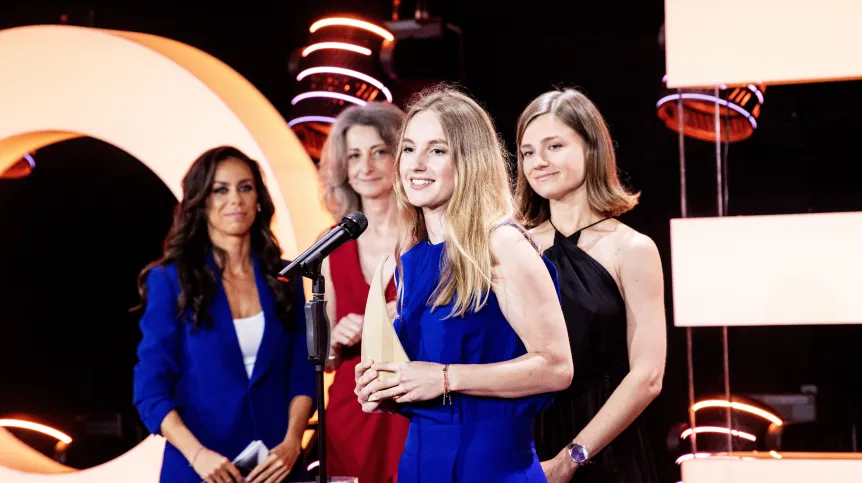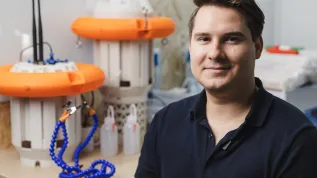
Inventor Olga Malinkiewicz is the first Pole in history to win the European Inventor Award - a distinction awarded by the European Patent Office (EPO). At the ceremony in Valletta, Malta, she also received the Popular Choice Award.
Dr. Olga Malinkiewicz, co-founder and director of technology at Saule Technologies, was awarded along with her team in the 'small and medium-sized enterprises' (SMEs) category. She beat competitors from Finland and France with 'solar energy technology using cost-effective and environmentally friendly perovskite solar cells'.
Perovskite cells, printed on flexible film, are 'light, ultra-thin, translucent and very efficient, even in artificial light', thanks to which the scope of their applications is wider than in the case of traditional silicon cells, describes Saule Technologies, the first company in the world to launch their production.
'We say that necessity is the mother of invention, and we all need clean energy. Sharing my research with people has always been the essence of my work as a scientist', Malinkiewicz said at the European Inventor Award ceremony at the Mediterranean Conference Centre in Valletta (Malta).
During the ceremony, the winner of the Popular Choice Award was also announced, selected from among all 15 finalists in an online vote. Olga Malinkiewicz received this award as well.
While receiving the statuette, she presented a perovskite cell printed by her company. 'Even though we don't have direct sunlight here, the cell started producing electricity. Imagine how it can work outdoors. Imagine that you can cover any surface with such cells: walls, roofs, floors. This is energy available to everyone', she said.
She added that access to energy using this technology is further facilitated by the method of producing perovskite cells, i.e. printing them.
The winner in the 'Industry' category was the Italian-German duo Fiorenzo Dioni and Richard Oberle. The engineers were praised for 'revolutionising the automotive industry with precision aluminium casting methods'. Their high-pressure Giga Press die-casting machine, developed for electric vehicle production, 'helps to reduce the waste, energy consumption and carbon emissions associated with automotive manufacturing'.
'Our invention reduces carbon dioxide emissions by 40 percent and can make electric cars more accessible. Our work is not only about technology, but also about sustainable development and safety', Fiorenzo Dioni said during the ceremony.
German computer scientist Dr. Cordelia Schmid is the winner in the 'Research' category - thanks to the creation of 'improved machine learning applications' that can be used in everyday technologies. Schmid's research has enabled artificial intelligence to 'see' and interpret complex visual data in real time. 'Her work is a step towards a future in which interactive robots and self-driving vehicles provide solutions for pressing problems', the award justification said.
'Computer vision and machine learning are already part of our lives, they appear in countless everyday objects, even if we are not aware of it', the computer scientist said while accepting the award.
This year's winners also include a Japanese scientist, specialist in metallurgy, Dr. Masato Sagawa (the 'Non-EPO Countries' category), the creator of 'the strongest permanent magnets that are crucial for advanced technologies'. He developed extremely durable and demagnetisation-resistant sintered neodymium-iron-boron (Nd-Fe-B) magnets. This solution can be used, for example, in medical equipment, ABS brakes, washing machines and wind turbines.
'I hope this award will inspire young people and convince them how useful materials science can be for society', Dr. Sagawa said during the ceremony in Malta.
The Lifetime Achievement Award went to Professor Carol Robinson, the first professor in history at both Cambridge and Oxford universities, a specialist in physical and theoretical chemistry. The jury appreciated her contribution to blood analysis, drug development and biochemical research.
In the capital of Malta, Valletta, Professor Carol Robinson announced the names of the winners of the Young Inventors Prize, awarded for the third time.
The main prize (and EUR 20,000) in this category went to the Dutch inventor Rochelle Niemeijer, creator of a portable test kit for the quick diagnosis of bacterial infections.
The second prize (EUR 10,000) went to Valentyn Freszka (Ukraine), creator of a technology for producing ecological paper from fallen leaves, which prevents deforestation and reduces carbon dioxide emissions.
Also on the podium were Khaoula Ben Ahmed, Ghofrane Ayari, Souleima Ben Temime and Sirine Ayari (EUR 5,000). The Tunisian women have developed MOOVOBRAIN - an smart solution for controlling a wheelchair using brain waves, which enables people with severe disabilities to move independently.
The European Inventor Award has been granted annually since 2006 by the European Patent Office (EPO). The award winners are scientists and engineers whose inventions 'help advance technology and significantly improve the quality of life'.
'Our mission is to register patents. But patents do not fall from the sky, there are people behind patented inventions. That is why the EPO established an award for inventors to recognise those who invent and improve technologies that are to serve us all', Luis Berenguer Giménez, spokesperson for the European Patent Organization told PAP.
He added: 'The greatest invention in history is the human brain. Thanks to it, we can create breakthrough solutions and continue to exceed the boundaries of knowledge'. (PAP)
Anna Bugajska z Valletty
PAP - Science in Poland
abu/ bar/ amac/ kap/
tr. RL













